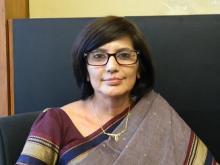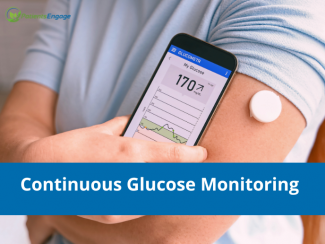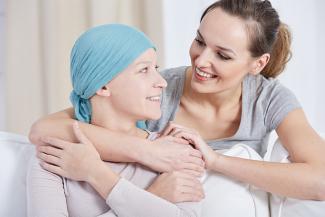
Cancer affects and changes family and societal relationships. How are interpersonal relationships impacted when a woman is undergoing treatment for cancer? How do priorities change?
We spoke to a cross section of breast cancer patients and survivors across the country and beyond to find out their experience, how their relationships were affected, how their outlook of life changes and what keeps them motivated.
Did any of your interpersonal relationships with family, friends, relatives, neighbours or co-workers get affected during your cancer treatment? What were some of the positive and negative impacts and how did you deal with them?
Geetha K Paniker
Teacher and Author
Cancer diagnosis can affect the whole family as much as it affects the patient. Sometimes, the complex feelings and changes caused by cancer become as overwhelming for others in life as they are for the person afflicted by cancer. Understanding is the key factor. Mutual support strengthens relationships during this challenging time. When cancer happens, it affects the whole family. The shock of the diagnosis and the demands of treatment can put a strain on your closest relationships. I have mixed feelings when I look back. But I had the support of my family members. I was strong enough to face the consequences of the disease.
The negative impacts begin when you are taken for granted and there is lack of understanding. But the strength and will power is the only thing that takes you forward in the journey. You have to take care of yourself, give priority to yourself, which seldom women do.
One of the drawbacks of the treatment and disease is vulnerability. That is where I lack understanding. Vulnerability sneaks in, to weaken the fortress of strength. But then I realise that I have to tame my mind and that power lies only within me.
Parul Banka
Coach and Author
Yes, interpersonal relationships changed. When a massive crisis like cancer strikes, you find out who your true friends are. In fact, it was the time when I was completely surprised with who stood by me and who didn't. I was surprised when some colleagues stood by me as if they were my best buddies. Similarly, some of the people who meant the world to me stepped away, said nothing or completely disappeared from my life. It both shocked me and hurt me at the time. However, with the benefit of hindsight, I have understood that most of these people were bogged down with their own fears. They were afraid for me, as well as they were appalled at how fragile life can be and how it can change in a moment - like mine had. What looked like apathy at the time was not apathy, nor was it about me; it was about them and their own fears. Some people even said nasty things - like 'I did it to myself' or 'how they would experience loss because of my cancer'. Totally shocking I know....but again it was their discomfort at facing their inner fears like loss and mortality.
Most of these people came back after the crisis was over. There was a fair bit of work on 'forgiveness' and 'understanding other people's perspective' that I had to do before these people became part of my life again. It was not easy but was totally worth it. On a practical as well as spiritual level, forgiving and moving on is important - there is no value in punishing ourselves for what others have/haven't done. There were few relationships that I had to let go of and that is OK.
Having said that, there were some people who stayed by me no matter how tough it was for them to see me go through cancer or how scared they were of losing me or how afraid they were of being left behind or generally how hard it was for them to be in the cancer world. These people are my stars. Cancer served as the catalyst to strengthen my bonding with these people. When someone is there for you when you hit rock bottom, they totally deserve to share the sunshine with you later.
Parul Banka below : I Talked Candidly About My Cancer

Rita Banik
Founder of RACE to rein-in-cancer
There were minor issues during the treatment; may be due to the fact that all of us were facing the treatment for the first time. Everyone was worried and tried to do their best as caregivers, but lack of knowledge sometimes created misunderstandings. No, my relationships did not get hampered due to the treatment.
Positive impact – I came to know that I had so many cousins, family and friends who care for me. For them, my presence and life mattered more than my cancer.
Negative impact - Heard some comments that made me wonder at the thought process of educated society. That was when I realized that there were so many myths related to cancer and there was a vast gap between western society and our society. I also realized that lack of cancer awareness, its symptoms and lack of knowledge about treatment options was the major cause even in well-to-do, educated masses.
Shachi Marathe
Journalist
Not really, I was young (23 years old) and handling all house responsibility's after my mother’s death. So, not much has changed, only when we visited genetic department of Tata Hospital and came to know that my cancer was hereditary (my mother had ovarian and my cousin sister breast), I was little worried about my younger sister. So we both got tested. (DNA test) and her test report was negative, which means she was not under risk of hereditary cancer. Otherwise, I was living a normal life.
Shachi and Mukesh below - Love in the Times of Cancer
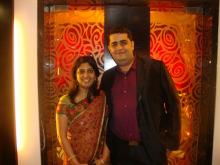
Did your priorities change? How?
Geetha K Paniker: My priorities in life changed at a later stage. But I learned to value life more and started enjoying the simple joys of life. I started living for 'the moment' of life as my body started getting affected with age, lack of immunity and repercussions of the disease. Nature became my healer. I looked up to everything in nature whenever I was at the crossroads both emotionally and physically.
Geetha Paniker below: I Can Honestly Say Cancer Changed My Life
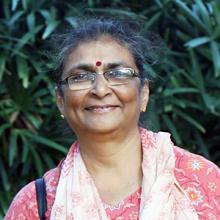
Parul Banka: I have come to appreciate how easily and quickly life can change - mine did as soon as my doctor uttered the words "You have cancer". I do not sweat petty stuff anymore. I also see surviving cancer as a second chance at life. Now I do my best to live it fully every single day. There are days when I feel that my best effort was not enough; when that happens I try to be kind to myself, take the experience as feedback, press the reset button the next day and again do my best. We often abuse our bodies - through junk food, lack of exercise, stress or other unhealthy habits. Not only this, we don't see ourselves as enough - not tall enough, not thin enough, not dark/fair enough and the list goes on. I now appreciate that our bodies are irreplaceable, and therefore we must love them unconditionally. I no longer worry when people try to shame me for not being tall enough or not thin enough or some version of their....not enough.
Yes, I eat nutritious food and am particular about my exercise regime but that is because my body and health deserve all the love I can give them. I now understand that we can live our lives mainly from two places: love or fear. I have decided that I will do everything in my power to choose love over fear for everyone and everything. Living from a space of fear and negativity is just not worth it. This is an unending process of change and I continue working on it.
Rita Banik: YES, MY PRIORITIES CHANGED A LOT. I started thinking about cancer – how, why, what to do etc, things that had never crossed my mind earlier:
- Suddenly started feeling there was time shortage and started working more intensively
- Started traveling a lot
- Revived my old hobbies like swimming
- Listened more carefully to others
- Attended breast cancer support group meets
- Spoke in public about my treatment and issues faced by me
- Felt strongly for people with cancer
- Perhaps I became more of an extrovert from being an introvert
- Started writing a lot more than I did earlier
Shachi Marathe: Yes, I have become more health conscious. Now I am taking more care of diet and lifestyle.
Any tip/message to our community…
Geetha K Paniker: Life leaves you at crossroads and as you choose the path to tread upon, you realize you are the only person who can heal yourself. It is not easy.... yet attainable with patience. Challenge your inner strengths and curtail expectations of life. Do this for yourself and your wellbeing. I look up to nature to heal me.
Parul Banka: Yes, I want to repeat the key message that I also shared in my book My Cancer Journey: A rendezvous with myself. "Being in a fearful situation is a circumstance, being stuck in it is a choice". We may not be able to choose what happens to us but we can definitely choose how we respond to it.
Rita Banik: It is very easy to get into depression at different points of time during and post treatment, some of the reasons being as follows: There are people who scare you off or disappoint you due to certain myths embedded in their minds; you may feel lonely and get a ‘good for nothing’ kind of feeling; you may be restless or get insomnia; changes in your physical appearance or some handicaps due to the treatment may ruin your social life; moreover the tag of cancer survivor sometimes becomes a social taboo. Some of these or maybe some other reasons/factors are good enough to make you depressed. But it is all up to you how you handle it. Keep yourself busy, indulge in your hobbies, make positive minded friends; travel, do what you like and be happy.
- Do breast self-examination (BSE) regularly. If you feel any changes then go for breast clinical examination (BCE) without any hesitation
- If you feel a lump in breast or underarms, tell your closest friend or family. Do not hide it.
- Keep physically fit by doing regular exercise and eating healthy. Try to have alkaline diet.
- Do not make cancer a social stigma - talk about it, understand and share the myths with others.
- Always remember EARLY DETECTION SAVES LIVES!
Rita Banik in pic above
Shachi Marathe:
- Trust only your doctor for facts (regarding your treatment n disease)
- Always think towards solutions
- Have faith

